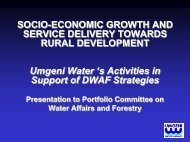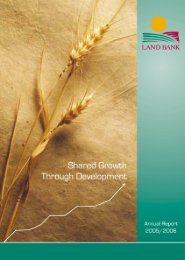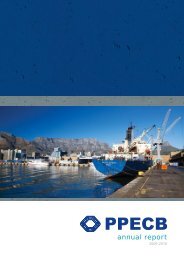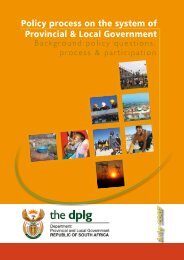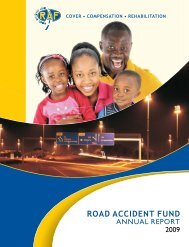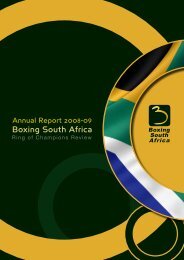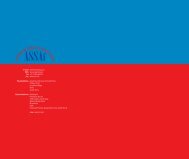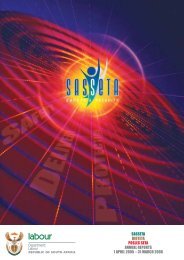Human Settlements Review - Parliamentary Monitoring Group
Human Settlements Review - Parliamentary Monitoring Group
Human Settlements Review - Parliamentary Monitoring Group
You also want an ePaper? Increase the reach of your titles
YUMPU automatically turns print PDFs into web optimized ePapers that Google loves.
<strong>Human</strong> <strong>Settlements</strong> <strong>Review</strong>, Volume 1, Number 1, 2010<br />
“It is about understanding the unfolding<br />
and dynamic interplay between nature and<br />
culture and treating design as if it is a process<br />
of participating in and reconciling these<br />
processes as they flower into forms that best<br />
benefit people and the planet” (Buchanan<br />
2008, 128).<br />
Design also needs more of what Albert<br />
Borgman terms “spacious awareness and<br />
humility” (Borgman 2008, 6). He discusses how<br />
premodern cultures were keenly conscious of<br />
space – they could and did inhabit, at least<br />
conceptually, the whole universe (Borgman<br />
2008, 6). “In contrast, the semantic space<br />
most people in our rich Western democracies<br />
inhabit is just the surface of the earth”<br />
(Borgman 2008, 6). Borgman states that we<br />
live in ambiguous space (2008, 14). Many of<br />
the technological and economic advances<br />
often considered as evidence of our cultural<br />
vitality are smoothing and accelerating<br />
private forms of transportation, information<br />
and consumption and are thus fomenting the<br />
feeling of restlessness and unreality that is<br />
the curse of destitute space. We are largely<br />
unaware of the destitution of space, because<br />
we think that the threat to space is material<br />
poverty rather than experiential destitution.<br />
David Orr (2007, par. 17) suggests that we<br />
need a standard for our work, rather like the<br />
Hippocratic Oath or a compass by which we<br />
chart a journey. For that David Orr (2007)<br />
proposes that “designers should aim to cause<br />
no ugliness, human or ecological, somewhere<br />
else or at some later time” (par. 17).<br />
“That standard will cause us to think upstream<br />
from the particular design project or object<br />
to the wells, mines, forest, farms and<br />
manufacturing establishments from which<br />
materials are drawn and crystallized into<br />
particularities of design. It will cause us also<br />
to look downstream to the effects of design on<br />
climate and health of people and ecosystems.<br />
If there is ugliness, human or ecological, at<br />
either end designers cannot claim success as<br />
a designer regardless of artfulness of what is<br />
made” (Orr 2007, par 17).<br />
Orr (2007) further suggests that we must<br />
think of ourselves firstly as place makers not<br />
form makers – this difference he stresses is<br />
critical (par.18). He argues that design has<br />
conventionally or traditionally been mostly<br />
indifferent to human and ecological costs<br />
incurred elsewhere (Orr 2007, par.18). Place<br />
making he argues must honor and preserve<br />
other places, however remote in space and<br />
culture (Orr 2007, par. 18).<br />
Paradigm Shift<br />
Questions of sustainability typically center<br />
around energy usage, consumption patterns<br />
And issues such as water scarcity. We must,<br />
however, keep in mind much deeper questions<br />
that rarely find their way into political debate<br />
or public discourse and there will need to be<br />
attempts to integrate economics with ethics,<br />
culture and spirituality. Such conversations<br />
about changes in governance, economics,<br />
social norms and daily life that must be made<br />
to avoid the worst of what lies ahead are only<br />
beginning.<br />
We in the comfortable middle class must be<br />
prepared to “give up”, give up cars, rethink and<br />
reimagine cities and be prepared to share<br />
129



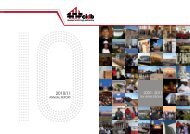
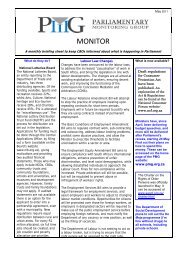
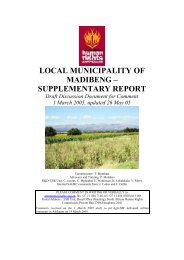
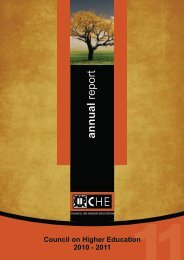
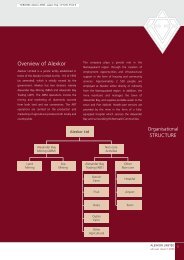
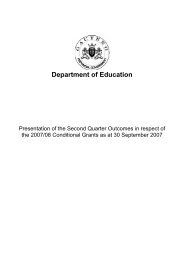
![National Research Foundation Annual Report 2008 / 2009 [Part 2]](https://img.yumpu.com/49774036/1/177x260/national-research-foundation-annual-report-2008-2009-part-2.jpg?quality=85)
